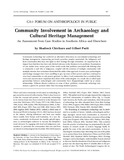Community involvement in Archaeology and Cultural Heritage Management: an assessment from case studies in Southern Africa and elsewhere
Date
2008Author
Chirikure, S.
Pwiti, G.
Publisher
University of Chicago PressType
Published ArticleMetadata
Show full item recordAbstract
Community archaeology has conferred an alternative dimension on conventional archaeology and
heritage management, empowering previously powerless peoples, particularly the indigenous and
local communities that have lost rights to their heritage through colonialism. So important has its
impact been that there has been only limited reference in the literature to its problems. Examination
of case studies from various parts of the world reveals that problems associated with defining what
a community is and who is indigenous, coupled with the existence of multiple communities with
multiple interests, have sometimes diminished the utility of the approach. In some cases, archaeologists
and heritage managers have been unwilling to give up some of their powers and have continued to
view local communities as only passive partners. In others, local communities have considered their
views and concerns more important than those of the archaeologists. As a result, the so-called equal
partnerships between archaeologists and communities have disappointingly ended up as uneasy
relationships. Without effective solutions to some of these problems, community archeology may
remain a goal to be pursued rather than becoming standard practice.

